Kissing Books: Harmony between romance and pop music
Every month, Olivia Waite pulls back the covers, revealing the very best in new, and classic, romance. We're extending a hand to you. Won't you take it? And if you're still not sated, there's always the archives.
Seattle likes to make up for the long, grey winters by exploding as soon as the weather warms. People prise open the pollen-mortared windows of their homes and their cars, and concert series bloom at every waterfront, winery, and from top to bottom over our city’s hills.
Everywhere, music spills out.
A lot of those songs are love songs. And you’ll notice a lot of the same reactions to love songs—especially femme-y, upbeat, feel-good pop songs—that you see critics sling against romance. Predictable. Saccharine. Unreal. Trivial. Pop music is coded feminine the same way rock is coded masculine, and cultural heft is parceled out accordingly. Ryan Adams covers the entirety of Taylor Swift’s 1989 and critics exclaim that his knockoff is more creative and sincere and important than her original. Back in 2012, Carly Rae Jepsen’s “Call Me Maybe” was lighting up the summer and a writer in the LA Weekly with this tautology: “I asked my youngest sister about it. She said it was excellent, which alone proves that it’s not.” That summer I started having flashbacks to the era when Toni Basil’s “Mickey” was everywhere and widely reviled as the World’s Most Annoying Earworm.
You’ll notice how many of these famously annoying songs involve femme-looking people singing frankly about their agency in sex and love and romance. Taylor Swift is notorious for, well, lots of things, but particularly for putting history with her exes into her lyrics—in fact, she wrote a hit song inviting the listener to be one of the future exes she’ll write hit songs about. “Call Me Maybe” is about a girl giving her number to a boy not because he asked, but because she wants to give it to him. And listening to “Mickey” as an adult is mildly unsettling, since the lyrics are definitely about how much the singer wants to bang the title dude and I definitely remember bopping along with that song with all the other ten-year-olds at summer camp.
To this list we could add so many other examples: the Spice Girls, TLC, Hanson, Madonna, Katy Perry, Meghan Trainor, pre-tattoo Justin Bieber, Britney Spears, and Mariah Carey, just to name a few. Hell, even the early Beatles were mocked on account of their primarily female fanbase and girl-group hit covers—until male critics rewrote history after the fact to make them Official Preordained Geniuses of Rock. I haven’t peeked to see if contemporary reviewers slagged on the Supremes, Dusty Springfield, and Martha and the Vandellas, but I wouldn’t be at all surprised to find they had. What Susan Douglas wrote in 1994’s Where the Girls Are is nearly as true today: “Girl group music has been denied its rightful place in history by a host of male music critics who’ve either ignored it or trashed it.” Stop me when this starts to sound like a certain literary genre we all know and love.
The more I look at the parallels between romance and pop songs, the more I feel this particular strain of vitriol is like an immune reaction: it froths up whenever the system — our dude-centric, white-focused, heteronormative system — can’t resolve the tension between a work as an expression of a feeling and a work as a commercial product for sale. How can you create something that evokes a real part of yourself and then turn around and sell it for money? This might explain why this rhetoric of annoyance centers so much around work by women and girls. Women’s labor is like women’s love: it’s supposed to be given, not purchased. We don’t get anxious about male musicians asking for money because we assume men’s work deserves recompense. But when a young woman offers up a piece about her love life, and then expects us to pay her, the culture clutches its pearls.
One of our books this month features a 1920s black couple whose romance unfolds through jazz numbers, studio sessions, and song lyrics. Miles and Leigh worry about sales and hits, about competing with other bands at other clubs. But they also worry about getting the words just right—making them say something true, something real. It’s both work and a miracle at once, inseparable. And doesn’t that sound just like true love to you?
Recent Romances:
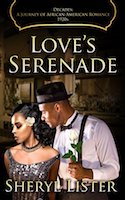
Love’s Serenade by Sheryl Lister (self-published: historical m/f):
Let’s cut right to the first, irresistible hook: He steals her sheet music!
Smooth-talking piano player Miles Cooper convinced good-girl church singer Leigh to run away with him to the big city—then snuck out of the boardinghouse while she slept and took her sheet music with him. It’s so much worse than just breaking the girl’s heart. I could cheerfully have murdered the man for this, and I couldn’t wait to see how the author could possibly redeem him.
Years later (but mere paragraphs in book time) Miles comes back, all soulful eyes, begging for a second chance.
So Leigh—by now a successful speakeasy singer—punches him. Right hook to the jaw, no hesitation. He laughs, admits he deserved it, and promptly hands her the sheet music back.
Reader, I was delighted. Just like that, we’re on an even playing field again. Miles and Leigh are cautious, cagey types—except when they’re together, when they just can’t seem to hold back. This book is as bold and direct as red lipstick, the prose light and clean as an old and well-worn song. I wish the emotional arc wasn’t interrupted in the middle by what felt like an unnecessary conflict from the heroine’s past. But the sense of place and time is gorgeous, and I’m an easy mark for a Harlem-set historical with a cameo by Zora Neale Hurston. This book is number four in the Decades series, which features one African-American historical romance from every decade from 1900 until 2010—so if you’re looking for stories from lesser-seen historical eras then this is definitely something you’re going to want to look into.
The next song started, and Leigh froze. She’d recognize that piano style anywhere. It can’t be. Her heart started pounding. She whipped her head around and her gaze collided with the one man she thought she’d never see again.
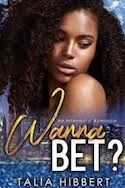
Wanna Bet by Talia Hibbert (self-published: m/f contemporary):
This is one of those rare romances that feels…comprehensive. The romance is not just one episode in the character’s life, but the key to the meaning of the whole. The book has to jump around a bit in time to accomplish this, which means the pacing is somewhat measured, but the time is very well spent. We’ve gotten to know heroine Jasmine well enough that by the time hero Rahul shows up, we can fill in her reactions to their meeting while we’re learning his. And then perspective switches, and we’re filling in Rahul’s thoughts while Jasmine narrates. Normally you only get that kind of layered double-reading pleasure quite late in the romance; having it turn up so early and so often is a real delight.
That’s not the only pleasure Talia Hibbert has to offer. Lyrical prose, electric dialogue, and I had to stop every chapter and remind myself to breathe because this book is pining with a capital P. Jasmine is sharp, dazzling, and fierce; she’s also fragile, cagey, and too proud to ask for what she wants most. Rahul is outwardly rock-steady but secretly a live wire of lust and overanalysis and unspoken hope. I have seen too many Bollywood movies for that name not to conjure visions of Shahrukh Khan, which gives an extra-fun kick to the pining and to the (many, gorgeous) sex scenes. Normally in a romance I feel more pulled toward one of the protagonists (the hero here, the heroine there): this book is one of the glorious times I get to fall headlong in love with both characters. I laughed. I cried. I damn well cheered. And then, when I was good and caught, this book took all the charm and the poetry and the yearning and shaped it into a knife to slice my heart into pieces—then fused it back together with seams of glittering gold, because you shouldn’t forget where the breaks were. It’s the faults that make something loveable. In sum: one of the greatest friends-to-lovers romances I’ve read in many years.The days passed slowly, all at once. Summer dripped over the city like spilled honey. Jasmine found herself disturbingly and unnaturally happy, and it was all Rahul’s fault.
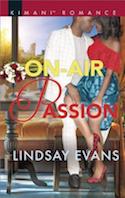
On-Air Passion by Lindsay Evans (Harlequin Kimani: contemporary m/f):
It’s a damn shame Harlequin is shutting down their Kimani line (romances focused on black and African-American characters) just at the point when the demand for inclusive romance is greater and more vocal than ever. A ton of the category romances (the genre term for short romances published on a monthly basis by Harlequin, Silhouette, Mills and Boon, and others) I’ve read in the past few years have been Kimanis. I’ve talked about romance novels being like champagne, but categories are more like a rosé: they’re pleasing, approachable, and best consumed in the same year they’re made.
This gem from Lindsay Evans has everything a category should: tight conflict, snappy prose, and character chemistry hot enough to burn the letters right off the page. Retired pro basketball player-turned-radio host Ahmed Clark thinks love is an illusion that distracts people from working toward meaningful change (for once it’s the hero with the activist’s social conscience!). Elle Marshall believes love gives humans hope, and has come on the show to promote her Atlanta business setting up memorable dates for couples. It’s hate at first sight, but the studio forces them to go on a date to milk the publicity, and of course the friction is mostly fueled by unacknowledged lust. Of course we know how it’s gonna end—we always know how it’s gonna end—but what keeps it from being predictable is the way Lindsay Evans knows how to zing a reader just when she gets comfortable. Touches of humor, wry observations, and beautifully comic descriptions add layers while the plot hurtles through the ups and downs: for instance, this early description of station owner Clive Ramirez, who “loved what he did for a living, fairly treated the people who worked for him, and loved drama like a teenage girl. But everybody had to have a hobby.”
Every emotion in this one is dialed up to eleven, every mistake is compounded, every feeling is wrung out of the characters. It’s a juicy, tart-sweet roller coaster of a read. Not every note lands—I could have done with much more of a grovel from our hero—but that feels sort of separate from the way this book is so good at rewarding a reader’s time and attention. It was like I’d been invited into a marvelous party: even the annoying bits are fun to talk about the morning after.
”Did you just say all those terrible things to that girl and then let her walk away?”
"Why were you so mean to her?”
“Are you super-paranoid?”
“What did she do to you?”
“Did you sleep with her and then basically just curse her out on the radio?”
“Ahmed, you’re messing up, man.”
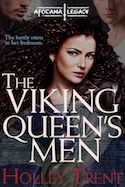
The Viking Queen’s Men by Holley Trent (self-published: paranormal m/f/m)
One of the reasons I love paranormal romance is the way authors are glad to head straight to Bonkersville by the fastest train. This gem from a few years back is a steamy series-starter ménage about a race of psychic matriarchal Vikings in the southwest, the telepathic branch of whom live in an isolated McMansion compound and the empathic branch of whom pose as a biker gang around a pub called the Longship. There are ancestral ghosts giving advice and sex that unlocks magic powers and finally, finally someone writing fated mates as plot complications and not mere excuses for in-book stalking and jealousy.
It’s all completely extra and I ate it up with a spoon.
Our heroine Tess is a former foster kid, a jailbird, and a stone-cold badass. Her voice is hard-bitten and bluntly funny and so lonely you ache in glorious sympathy. I wanted to hug her, then hand her a whiskey and tell her to kick back, then fight any of her enemies who dared to show their face. It makes total sense that our two heroes, smooth corporate type Harvey and ax-wielding biker Oliver, feel similarly: Harvey grew up in the same foster system as Tess, and Oliver has been having dreams of her for several years running. Now that she’s the crowned queen of the Afótama (read: psychic Vikings) she has to work out what her specific psychic talents are, solve the mystery of who kidnapped her away as a child, and negotiate an emotional and sexual balance with two dudes who don’t realize right away that they aren’t rivals and that she intends to keep them both. Hey, her dead many-times-great-grandma Viking thinks it’s a splendid idea, so why not? The whole tower of cards would collapse into a mess in a moment if it weren’t grounded with a live wire of an earnest, irresistible yearning to belong. Which is to say: yes, the psychic Viking ménage book made me cry. Book one ends on a bit of a cliffhanger, but if you like Shelly Laurenston’s shifters (boy, do I!), this series is going to be right up your alley.
"For fuck’s sake." She needed to get her head out of the real world. They weren’t going to resolve their dilemma like reasonable people, because they were Vikings.
This Month’s Aerospace Engineer/Astronaut Heroine Who Can Have it All
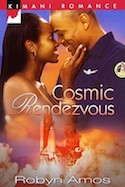
Cosmic Rendezvous by Robyn Amos (Harlequin Kimani: contemporary m/f):
Unlike governesses, cowboys, or BDSM sex club proprietors, astronaut heroes and heroines are not common enough to count as their own romance subgenre. I still read every one I can find (like this small sampler) because of how they dramatize one of the big tensions of romance: Staying versus Leaving. Space is big! It’s dangerous! It’s distant! It’s the farthest Away a human could possibly get! Space is the opposite of home. A lot of non-romance astronaut stories revolve around this idea as well: Gravity, Interstellar, and Apollo 13. So in order to Stay—since any HEA depends upon the protagonists Not Leaving—the astronaut hero or heroine has to forgo going into space. Which is a big deal, because they’ve worked all their life to get into space, and also because space travel is so strongly associated with positives like nobility/knowledge/adventure. An astronaut hero or heroine always has to find a reason to knowingly, willingly choose domesticity. It is a sacrifice.
Unless you’re Shelly London, the heroine of Cosmic Rendezvouz.
Shelly is an aerospace engineer who has designed a new kind of capsule. She dreams of being the one to fly it into space, so she’s applied to the astronaut program, only to be turned down over and over (spoiler: because her overprotective Senator mother keeps leaning on the officials, it’s awful, I loved it). Our hero Lincoln is a hotshot test pilot and astronaut golden boy: he made a famously daring emergency shuttle landing that landed him on the cover of Time magazine. So the tension in this romance is not just that Shelly finds Lincoln inconveniently attractive: it’s that he breezily, effortlessly embodies everything she’s fighting to achieve. It’s frustrating as hell.
And because I’ve read quite a lot of romance, and a lot of astronaut romance, I fully expected there to be some reason why Shelly would never achieve her dream. Astronauts have to resist the temptation of space, and a lot of romance heroines have to learn that Career is Less Important Than Living Life, or whatever. I braced myself for the coming disappointment.
Wrong again! After a suspense plot involving sabotage—the less said about this the better—Shelly becomes an astronaut. A great astronaut. With her own solo picture on the cover of Time and everything. Because of course the Staying versus Leaving dynamic presumes one partner has no choice about staying. That game was rigged and I never noticed.
But Shelly is given the choice. She chooses space because she wants it. She chooses Lincoln because she wants him, too. This book is about a heroine—a black heroine—coming to realize that she doesn’t have to sacrifice any part of herself in order to be happy.
And that’s the kind of book I’ll never get tired of.